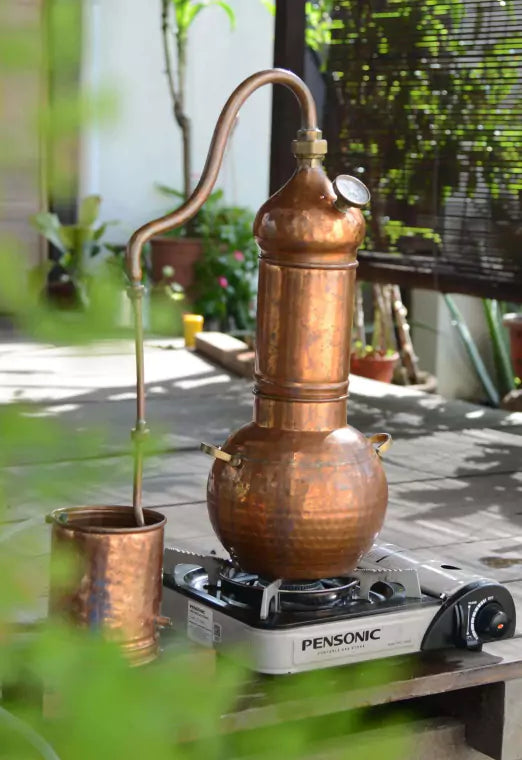About Us
What are Carrier Oils?
Carrier oils are made from the fatty parts of plants, seeds, nuts, or kernels. They have been in use since the introduction of aromatic oils and bath products in ancient Greece and Rome.These oils are called "carrier" oils because they are often used as a base to dilute and "carry" essential oils, which are highly concentrated and can be too potent to apply directly to the skin. Carrier oils are commonly used in various applications, including aromatherapy, massage therapy, skincare, and hair care.
When using carrier oils, it's essential to choose one that suits your specific needs and skin type and to ensure that it is of high quality and suitable for your intended application. Always perform a patch test before using any new oil on your skin to check for potential allergies or sensitivities.
Extraction Process
How Are Carrier Oils Extracted
These hydrosols are obtained in the process of producing essential oils or in the process of distilling plants to obtain pure hydrogens. Steam distillation of plants results in the production of oil, the essential oil, and the hydrosol, a water component, which contains low levels of essential oils. Hydrosol is a water with aromatherapy value that can be used without difficulty.
-
Make sure "hydrosol" is listed in the ingredients.
A high-quality hydrosol's primary ingredient should be the actual hydrosol, not a mixture of essential oils and water.
-
No added fragrance or perfume.
Hydrosols don't need any added artificial fragrance - they're aromatic on their own.
-
Nothing with water as the first ingredient.
Either the product was not produced from distillation or the company diluted the product to save money.

Our Benefits
Benefits of Carrier Oils
Hydration and Moisturization
Essential fatty acids and other nutrients found in carrier oils help to hydrate and moisturise the skin. They can smooth out the texture of the skin, stop it from drying out, and treat flakiness and roughness.
Soothing and Healing
Some carrier oils, like jojoba and coconut oil, are calming and anti-inflammatory. They can aid in calming inflamed skin, reducing redness, and accelerating the healing of small burns or skin lesions.
Hair Care
For the health of your hair and scalp, use carrier oils. They can support a healthy scalp, lessen frizz, and moisturise and condition hair, all of which can result in thicker, shinier hair.
Aromatherapy Carrier
Carrier oils act as a neutral basis for essential oils in aromatherapy, allowing the smells and therapeutic effects of the essential oils to be released gradually via diffusion or topical application.

Application of Carrier Oils
-
Diluting Essential Oils
One of the main applications for carrier oils is this. Always dilute essential oils with a carrier oil before using them topically or for aromatherapy to lessen their potency and avoid causing skin irritation. It might vary based on the essential oil and the intended use, but a typical dilution ratio is 1-3% essential oil to carrier oil. -
Massage
Frequently, carrier oils are utilised in massage therapy. They give both the therapeutic effects of the massage as well as the lubrication that enables your hands to go over the skin without catching. To promote relaxation, briefly warm the carrier oil before applying it for massage. -
Haircare
To enhance the health of the hair, carrier oils can be applied to the scalp and hair. They can be applied as conditioners, leave-in treatments, or hair masks. To add moisture and lessen frizz, apply a small amount to your hair, paying special attention to the ends. -
Nail Care
Cuticles and nails can be nourished with carrier oils such sweet almond or argan oil. For moisturised, healthy nails, rub a small amount into the cuticles and nails. -
Bath Oil
Your favourite carrier oil can be added in small amounts to the bathwater for a moisturising and calming bathing experience. Your skin will remain nourished and soft thanks to the oil.
What iIs The Difference
Difference Between Essential Oils And Carrier Oils

Essential Oils
Essential oils are extracts that have been greatly condensed from different plant components, such as leaves, stems, flowers, and roots. They capture the concentrated essence, aroma, and therapeutic qualities of the source plant. Essential oils are renowned for their potent aromatic and therapeutic attributes, such as relaxation, stress relief, and anti-inflammatory effects. However, they should never be administered straight to the skin without dilution, though, as they are very concentrated. To guarantee safe use, they are usually combined with carrier oils.

Carrier Oils
On the other hand, carrier oils are less concentrated vegetable-based oils that are obtained from the fatty parts of plants, such as seeds, nuts, or kernels. They are used to dilute essential oils so that they are suitable for topical application to the skin. Carrier oils act as a "carrier" for essential oils, facilitating equal distribution and absorption while lowering the possibility of skin irritation. Carrier oils are chosen not only for their dilution properties but also for their unique skincare benefits, such as moisturizing, soothing, and nourishing the skin.
Why Us ?
Featured collection
This means they’re gentler than essential oils and can be applied directly to your skin without needing to dilute them with a carrier oil. They also have a more subtle scent than their essential oil counterparts. Essential oils and hydrosols have some similar properties, but hydrosols have a much higher water content.


















